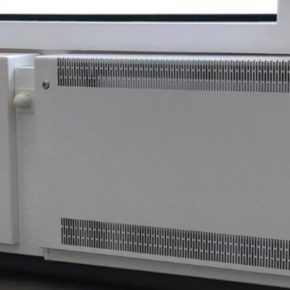
How to select an LST Radiator with Contour
Low surface temperature radiators (LSTs) are becoming the preferred choice for specification in environments where safety is an essential component; this piece from Contour explores how to select the best LST radiator for your next project.
Environments such as schools, hospitals, care home and prisons/custodial settings are all examples where such a solution would be appropriate.
There are numerous low surface temperature radiator solutions out there, so it is crucial for those involved in product specification to be aware of other features to look out for – in order to provide the safest possible solution.
Metal Durability For Your LST Radiator
Of course, every environment is different, and this will determine the thickness and type of metal that you go for. Generally, Contour advocate steel, Magnelis or aluminium.
In relatively ‘hazard free’ environments such as a mainstream school classroom, 1.5mm magnelis steel would be the most appropriate option. This can be increased to 2mm if the setting is vulnerable to damage, for example, in a nursery or special educational needs setting.
LST Radiators for Wet Environments
Wet environments, including toileting facilities and wet rooms will require a slightly different solution to avoid rust damage. In this instance, Contour recommends Magnelis Steel.
Magnelis is just as strong as steel but it has been cured with an additional treatment stage – similar to hot-dipped galvanising. This process makes the material 10x more resistant to rust when compared to a traditional galvanising process.
RotaRad Kits for LST Radiators: Making Cleaning Easy
The environments mentioned in this blog all share one thing in common: the need to provide a clean, sanitary place to learn, work and-in some cases-live, and this should be apparent in the LST radiator you specify.
Traditional radiators are a breeding ground for dust, dirt and bacteria, which is not ideal in an educational setting – or anywhere occupied by vulnerable individuals.
Contour are firm advocates for the Rotarad rotating valve kits. This unique solution allows the LST radiator to be dropped down to floor level – giving cleaning operatives full access to the back of the radiator and the wall behind them.
Wall to Wall LST Radiators
If you opt for a wall to wall LST radiator, you will be unable to lower the radiator flat to the floor, meaning that your cleaning access will be limited.
If this is the case, Contour recommend adding door chains. This allows the casing to be lowered and left in place without it falling in an unsafe manner.
Door chains are effective safety solutions to consider when choosing LST Radiators, as they reduce the risk of financial losses being incurred to you as a result of staff being injured while cleaning.
Valve Types For LST Radiators
An often-overlooked consideration when specifying LSTs is the valve options that are available. Internal valve fittings can provide an additional element of safety in school, SEN and healthcare environments. Consider whether an internal or external solution would be best for your requirements.
Conclusion
All of the above features are factors of consideration for you when selecting LST Radiators – Contour can consult with you throughout the process to ensure you make the right decisions for you.
If you are working within a mental health environment, you may wish to consider an anti-ligature solution. If this is the case, check out our unique anti-ligature options, designed to help reduce instances of self-harm and suicide.
Whether you are looking for heating solutions in a school, hospital or any other working environment, Contour Heating can provide you with a bespoke quote that will consider all of your requirements and help you to select the best options for you.
If you would like further advice on how to select LST Radiators, click the link in the opening paragraph.
Contour can be contacted at;
The Mansions
43 Broadway
Shifnal
TF11 8BB
Tel: 01952 290 498
Email: sales@contourheating.co.uk
Visit Supplier's page
Latest news

28th March 2025
Ideal Heating Commercial announces 10-year warranty on Evomax 2 boiler
Evomax 2, the UK’s number one selling commercial wall-mounted boiler from Ideal Heating Commercial, is now available with a 10-year warranty.
Posted in Articles, Building Industry News, Building Products & Structures, Building Regulations & Accreditations, Building Services, Facility Management & Building Services, Heating Systems, Controls and Management, Heating, Ventilation and Air Conditioning - HVAC, Innovations & New Products, Pipes, Pipes & Fittings, Plumbing, Retrofit & Renovation, Sustainability & Energy Efficiency, Videos
28th March 2025
FLIR Si1-LD Acoustic Imaging Camera for Compressed Air Leak Detection
FLIR, a Teledyne Technologies company, introduces the Si1-LD, an industrial acoustic imaging camera that brings faster and more accurate compressed air leak detection to those operating on a modest condition monitoring budget.
Posted in Acoustics, Noise & Vibration Control, Articles, Building Industry News, Building Products & Structures, Building Services, Facility Management & Building Services, Information Technology, Innovations & New Products, Retrofit & Renovation, Sustainability & Energy Efficiency, Thermal Imaging and Monitors
28th March 2025
LIFTEX 2025 Seminar programme announced
Registration has opened for LIFTEX 2025. Now in its 37th year, LIFTEX 2025 is the UK’s only dedicated exhibition for the lift, escalator and access industry and takes place only once every three years.
Posted in Access Control & Door Entry Systems, Accessibility, Articles, Building Industry Events, Building Industry News, Building Products & Structures, Building Regulations & Accreditations, Building Services, Exhibitions and Conferences, Facility Management & Building Services, Health & Safety, Retrofit & Renovation, Security and Fire Protection, Seminars
28th March 2025
MCRMA welcomes ArcelorMittal UK to membership
A UK division of the global steelmaking business ArcelorMittal has become the latest new member of the MCRMA, the industry association representing the metal building envelope sector.
Posted in Articles, Building Associations & Institutes, Building Industry News, Building Products & Structures, Building Systems, Cladding, Facades, Posts, Restoration & Refurbishment, Retrofit & Renovation, Roofs, Steel and Structural Frames, Walls
 Sign up:
Sign up: